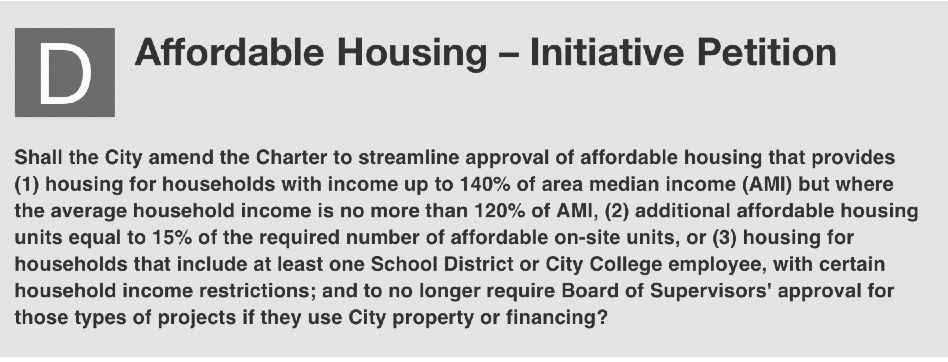The competing affordable housing measure Props D and E have incredibly similar wording, but their big-money backers are polar-opposite coalitions of tech investors on one hand, and trade unions on the other.
I can try to explain to you the differences between the two similar-sounding affordable housing measures Prop D and Prop E on your November 8 ballot in this 500-or-so-word article. But your mind may be made up by the remainder of this sentence — tech investor Ron Conway has contributed $40,000 to his preferred measure, Prop D. (This was a non-monetary contribution described as “slate mail.”) But plenty of deep-pocketed donors on both sides are writing real, actual checks to these competing affordable housing measures, the Mayor Breed-backed Prop D and the progressive wing of the Board of Supervisors-backed Prop E.


Yet the ballot measures have stunningly similar wording. As seen above, the three major differences to the measures are: how much a household would have to make to qualify for affordable housing (Prop D is a higher sum), how many affordable units the project needs to qualify for expedited approval (Prop E is a lower percentage), and whether the Board of Supervisors gets to approve or deny projects (Prop D would eliminate this).

And as you'll notice above, this fight has drawn the most money of any SF ballot measure fight this November. Admittedly, the graphic is a little cropped. But Prop D has raised $2.4 million in contributions (plus another $20,000 opposing Prop E), while Prop E has raised north of $940,000. Prop D’s donations are largely from tech moguls, Prop E’s donations are largely from trade unions.
Prop D’s biggest financial backer is the guy behind all those security cameras, Ripple Labs co-founder Chris Larsen ($250,000). And donating $100,000 apiece to Prop D, we have SF Standard financier Michael Moritz, Twitch CEO Emmett Shear, Thumbtack CEO Marco Zappacosta, and our old Trumpy friend, socialite Dede Wilsey.
Those contributing to Prop E are unions with confusingly interchangeable-sounding names: the Members‘ Voice of the State Building and Construction Trades Council of California ($325,000), the SF Building and Construction Trades Council Issues Committee ($200,000), and some IBEW, UA Local, and Pipe Trades union groups kicking down $75,000 apiece.
Both measures claim they would streamline approval of affordable housing projects. But notably, neither Prop D or E actually sets aside more money to build affordable housing — they only tinker with the approval process. And to that end, it’s unclear that frankly either measure would, in fact, lead to more affordable housing being built.
Developer TMG Partners CEO Michael Covarrubias puts it bluntly in the Chronicle's writeup on these props. “I have five developer friends who all said, ‘I’ve got this project approved, but it doesn’t pencil because the construction prices have exploded,’” Covarrubias told the Chronicle.
In other words, despite our decades-old stereotypes, right now inflation is probably stopping more housing construction that than the Board of Supervisors, the Planning Department, and NIMBY legal appeals combined.
Image: Joe Kukura, SFist

